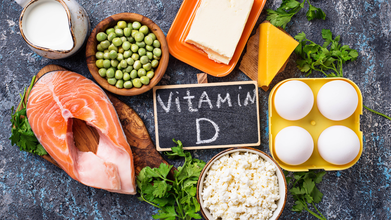- Health Conditions A-Z
- Health & Wellness
- Nutrition
- Fitness
- Health News
- Ayurveda
- Videos
- Medicine A-Z
- Parenting
What Is The Best Breakfast You Can Have After Having Too Much Sugar

Breakfast (Credit: Canva)
Amidst the ongoing holiday season, it is common to get indulged in sweets and a sugary diet. But more often than not, it leads to guilt, which many people try to overcompensate for by skipping breakfast. While this might seem like a magic bullet, health experts warn that this practice could be detrimental to your health. What Is The Solution? A well-balanced breakfast.
The best food to have in the morning after consuming excess sugar should be full of fibre and protein, as per dieticians. Both these nutrients help steady your blood sugar and insulin levels. Another advantage of such a breakfast is that it will keep you full, preventing you from indulging in sweet snacks due to cravings. It is also a good idea to keep the rest of your meals balanced throughout the day, regardless of whatever diet you might be following.
Other Ways to Keep Your Body Balanced
Besides consuming a protein-and fibre-rich diet, you should also stay away from soft drinks, packaged juices, and all sorts of aerated beverages. Your mood will get a nice boost after moving your body for about 30 minutes, especially if you exercise outdoors. Remember, exercise is not a punishment for eating too much sugar the day before. Instead, it is a better way to hit the reset button rather than starving yourself or attempting a detox.
How Does Sugar Affect Your Body?
Glucose is what fuels and refuels itself. Carbohydrates and sugar are the two sources of glucose. When you consume sugar or carbohydrates, the pancreas releases insulin to help the body effectively use the glucose for energy. In simple words, when you eat food, it breaks down into glucose which is taken to the cells (where is it used to produce energy) by insulin. But when you consistently overeat sugar and carbohydrates, that’s when problems can occur.
At this point, the insulin is ‘overwhelmed’ and cannot do its job effectively. This is called insulin resistance. When you have insulin resistance, the cells are starved of energy, so they will send a signal to the body that you need to eat, which leads to hunger and cravings. It can also lead to irritability, poor sleep and excess belly fat.
Why Should You Stay Away From Sugar?
Diabetes is a chronic disease that occurs when the body can't regulate blood sugar levels. Therefore, it is pivotal for even those without the condition to adopt a healthier lifestyle. Earlier research suggested that people who have a "sweet tooth" may be at an increased risk of developing certain health conditions, including depression, type 2 diabetes, and cardiovascular issues. On the other hand, health-conscious individuals may face lower health risks and gain additional metabolic advantages from their overall diet and lifestyle decisions.
Epstein Files Reveal Secret Muffin Recipe: All You Need To Know

Credit: Canva
As the United States Department of Justice continues to release the harrowing Epstein Files that lift the lid on years' worth of horrific crimes by the convicted American child sex offender, serial rapist and human trafficker, eagle eyed readers have noticed a unique breakfast item in the documents.
In a file titled 'J.E.E Operating Manual', experts found a 11-step muffin recipe named 'J.E.E. Muffin Recipe' that the felon insisted should be served to him every morning at 6.30am.
The Epstein files are over six million pages of documents, images and videos detailing the criminal activities of the financier and his social circle of public figures that included politicians and celebrities.
His co-conspirator Ghislaine Maxwell, who is also a convicted child sex trafficker and sometimes referred to as the "Lady of the House" is serving a 20-year prison sentence at a minimum-security prison camp in Texas.
What Is The J.E.E. Muffin Recipe?
To start off, the recipe involves 12 ingredients which are:
- 4 extra large eggs
- 3 cups Dark brown sugar
- 3/4 cup Olive Oil
- 4 cups Digestive Bran
- 5 cups Whole Wheat Flour
- 12/ cup Ground Flax Seed Mixture
- 12/ cup Flax Seeds
- 5 tsp. Baking Soda
- 1/4 tsp. Salt
- 1 cup Raisins
- 4 cups Whole Milk
- 1 tsp. Vanilla Extract
1. In a large bowl combine bran, flour, flax seeds, baking soda and salt
2. Beat eggs and sugar in the bowl of an electric mixer until thick and creamy.
3. Add oil to egg/sugar mixture and mix to combine. Also combine milk and vanilla and set aside.
5. Add flour and milk mixtures to egg/sugar mixture, alternating additions until combined. Do not over beat mixture.
6. Add raisins and stir until incorporated.
7. Pour mixture into an airtight plastic container and store in the refrigerator for 24 hours before using.
8. Grease large muffin tin with Pam Spray.
9. Fill tins to the top with mixture and top with chopped nut/sugar/flax .
10. Bake at 350 degrees F. for 35-45 minutes.
11. Combine chopped pecans, walnuts and almonds, wheat germ, flax seeds and brown sugar for muffin toppings
While public speculation runs rampant over why this digestion-friendly muffin recipe was a critical part of Epstein's daily routine, as many allege and theorize that it was fed to the children on his island, nutritionists claim that this bran-packed muffins can help your body in multiple ways.
Why Is This Muffin Recipe Good For Your Gut?
Dr. Anshul Singh, Team Lead, Clinical Nutritionist, Artemis Hospitals noted that this baked good is packed with tons of fiber, omega-3, iron and antioxidants, all of which are extremely beneficial for the body.
He tells Healthandme: "People often call this muffin recipe a high-fiber muffin and it is good for your health in small amounts. The fact that this recipe has a lot of fiber is its best quality.
"Digestive bran, whole wheat flour, ground flaxseed and whole flax seeds are all high in dietary fiber. Fiber helps with bowel movements, constipation and overall gut health. Fibre makes stool thicker which makes digestion easier and more regular.
"Flaxseeds also have omega-3 fatty acids which can lower inflammation and improve heart health. Raisins add natural sweetness, iron and antioxidants while eggs and milk add protein that keeps you full longer. Olive oil has healthy fats that help with digestion and the absorption of vitamins that dissolve in fat.
"These muffins might help people who have trouble with slow digestion or irregular bowel movements, especially if they drink enough water with them. But calling them detox or clean-out foods can be misleading. The liver and kidneys are two of the body's organs that help get rid of toxins. The fiber in these muffins is what really helps the digestive system work better.
"The recipe has a lot of sugar and fiber, so it's important to watch how much you eat. A muffin can be a filling, easy-to-digest snack instead of a cure-all."
However, Zoha Shaikh, Consultant Nutritionist at Nutriiya, warns that these muffins may also cause stomach issues including bloating, gas, acid reflux and diarrhea.
She told this publication: "This muffin recipe is rich in fibre and may help relieve constipation in individuals with low fibre intake. However, the combination of very high fibre, sugar, and milk can also trigger bloating, gas, abdominal cramping, loose stools and acid reflux especially in sensitive individuals.
"The high use of baking soda contributes to increased sodium load, making it unsuitable for people with hypertension. From a clinical nutrition perspective, replacing wheat bran with oat bran, reducing baking soda, moderating flaxseed quantity and adding psyllium husk can make the recipe more gut-friendly. Eggs and psyllium together also improve texture and fluffiness while being gentler on digestion."
Is February Feeling Gloomy Without Sunlight? Add These Foods In Your Diet To Avoid Vitamin D Deficiency

Credits: Canva
February often feels like winter’s longest stretch. The days are short, the sun rarely breaks through the clouds, and many people find themselves feeling unusually tired or low. Health experts say this is also the time of year when vitamin D deficiency tends to surface, especially in regions with limited winter sunlight.
While vitamin D is best known for its role in bone health, its impact goes far beyond that. As sunlight exposure drops in late winter, attention is turning to how diet can help support the body until brighter days return.
Why Vitamin D Matters for the Body
Vitamin D plays a key role in several essential functions. It helps the body absorb calcium, which is crucial for maintaining strong bones and teeth. It also supports normal muscle function and keeps the immune system working efficiently.
What is less widely discussed is its role in brain health. Vitamin D receptors are present in many areas of the brain, and low levels have been linked to changes in mood and energy. During winter, many people report feeling sluggish, unmotivated, or emotionally flat. While these symptoms are often blamed on stress or lack of sleep, reduced sunlight and falling vitamin D levels may also contribute.
Why Winter Increases the Risk of Deficiency
The body produces most of its vitamin D when the skin is exposed to sunlight. In winter, shorter days, heavy clothing, and more time spent indoors mean that this natural process slows down significantly. Even people who eat well can struggle to maintain optimal levels during prolonged periods of low sun exposure.
This is where food choices can offer some support, even if they cannot fully replace sunlight.
Fatty Fish as a Natural Boost
Salmon is one of the richest natural sources of vitamin D. It also provides high quality protein and healthy fats that support heart and brain health. Simple meals like oven baked salmon with potatoes and broccoli or a salmon rice bowl with vegetables make it easy to include in weekly meals.
Herring is another strong option. It contains both vitamin D and omega 3 fatty acids, which are known to support heart health. Traditional combinations such as herring with boiled potatoes or a light yogurt based sauce are both nourishing and filling.
Everyday Foods That Add Up
Eggs also contribute small amounts of vitamin D, mainly from the yolk. While they do not provide as much as fatty fish, they are easy to include in daily meals. Scrambled eggs, vegetable omelettes, or a soft boiled egg at dinner can all help increase intake over time.
Mushrooms are one of the few plant based foods that contain vitamin D, especially when they have been exposed to light. They are not a replacement for fish but can be a helpful addition for those who eat little or no seafood.
Food Helps, but Sunlight Still Matters
Nutrition can support vitamin D levels during winter, but it cannot fully make up for the lack of sunlight. Most vitamin D is still produced through the skin, not the diet. Experts advise making the most of daylight when possible, even short walks outdoors, while using food as a supportive measure until spring arrives.
Expert Reveals Why You Keep Gaining Weight Despite Barely Eating

(Photos: Canva)
Recent insights from medical experts show that even people who eat very less can gain weight due muscle mass, stress, and their body’s movement during the day.
Dr Mohit Bhandari, a robotic bariatric and endoscopic weight loss surgeon, founder and director of Mohak Bariatrics and Robotics at Bhandari Hospital Indore notes some people eat whatever they want without gaining weight, while others struggle even with dieting.
The secret lies in the complex interplay of genetics, metabolism, and environmental factors that influence weight management.
This is why are you are putting on weight, according to Dr Bhandari:
1. Metabolism Differences
Studies have shown that metabolic factors are involved in the development of obesity and that being overweight is not simply a result of "sloth and gluttony."The speed at which the body burns calories is different for every individual. A slower metabolism means that even consuming small amount of food can lead to gain.
Individuals with high level of physical activity are less likely to be obese as they mean calories quicker.
2. Hormonal And Lifestyle Factors
Many women experience weight gain during menopause due to a drop in estrogen levels and subsequently fat distribution. This can lead to risk of heart diseases, Type-2 diabetes and joint problems.Hormones like thyroid hormones, cortisol, and play a major role in weight regulation. Stress, lack of sleep and Insulin sensitivity are also factors that lead to fat storage in the body.
3. Loss Of Muscle Mass
When muscle mass decreases due to ageing, inactivity or illness, it often causes a decline in physical activity, which further lowers daily energy expenditure.Consuming a snack rich in carbohydrate with 10-20 grams of protein before and immediately after strength training sessions further acts as a responsible factor in gaining weight.
4. Gut Health And Digestion
Poor digestion can also trigger inflammation, which interferes with blood sugar levels.Additionally, it can also trigger inflammation, which interferes with normal metabolism and insulin function, encouraging fat storage.
© 2024 Bennett, Coleman & Company Limited

